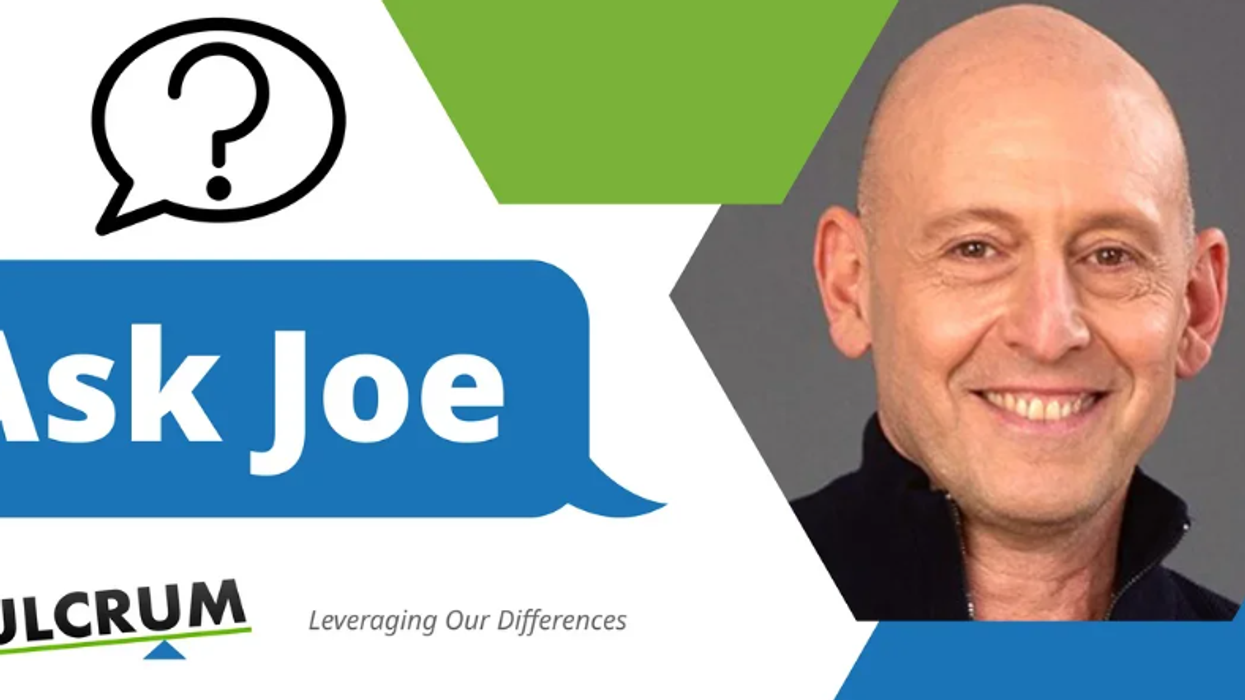Hi Joe,
I read your last article where you gave a woman advice on how to deal with her boss who keeps cutting her off in meetings. I think you gave some good tips, but you also mentioned that she may be talking too much as an option for what the problem is. Don’t you think by saying this that you are doing the same thing the boss is doing? To me, it comes across as another white man telling a woman how to act.
Keeping it Real
Hello Keeping it Real,
I really appreciate your question and the invitation for me to “keep it real”. I think if more of us had the courage to hold one another accountable in a respectful and curious way, we would have less arguments, fights, breakdowns in communication and therefore fewer opposition. As I always do when someone brings attention to something I’ve said or done, I take time to contemplate and consider their perspective. So, thanks for that opportunity.
My intention with my response to “Shut Down” in the last article was to give her different ways to look at the situation to help her arrive at the clearest perspective. When someone shares a situation with me, I must keep in mind that they can only offer me their perception of what is happening with only a few sentences to do so. As a mediator and peace advocate, I have to consider that this is not enough to get a complete picture.
In my book Fierce Civility, I discuss a pattern that many of us have where we quickly listen to the facts of a situation, or we read a post on social media. We often unintentionally add our interpretation of the story based on our own life experiences and draw our conclusions or judgments based on that. I talk extensively about how our internal polarizations color how we perceive reality. For instance, we seem to very quickly pick a “good guy” and “bad guy” in challenging events; this unfortunately sets up allies and adversaries before we even get a chance to gather the facts.
Having worked for many years with organizations around the world focused on addressing gender justice, I am very aware of signals where women are marginalized and oppressed. When I read “Shut Down’s” depiction of the story, my first quick reaction was to conclude that this is an example of a man putting a woman down. So, I had to make the pivot from my biases to remembering that my “interpretation” can only be confirmed as true when I take the time to investigate further.
This is what I am noticing is often forgotten in the process of getting to the truth of a situation and also a fundamental cause of our extreme polarization; which is a breakdown of civil discourse and inability to get to inclusive and fair solutions to our current problems. While our assumptions may be true, we will resolve issues faster and with more lasting results when we can still be curious, give others the benefit of the doubt, and remember that we all have the right to be presumed innocent until proven otherwise.
I believe that objectivity is an effective tool for solving problems. This helps me get to the root cause of the issue and break my polarizing way of seeing things. Yes, it is certainly true that women and other marginalized people are commonly shut down and disempowered in male dominated-cultures and environments. Additionally, it is also true that people in general take up a lot of time in meetings with their words. Both can be, and are, true.
I made sure not to interpret, judge or accuse in my previous article, and tried my best to objectively name the behavior. In doing so, I offered an opportunity for consideration that the problem may be that she is “taking up too much of the meeting with [her] words…”; this may or may not be true. Yes, this is a risk for me to suggest because of the depth of pain and trauma that women often experience. However, I feel that limiting the potential roots of the problem may actually be contributing to our inability to have effective conversations. I felt it worthwhile to take that risk.
So, Keeping it Real, while it certainly can look like I am hindering someone’s voice, my intent is to offer an alternate course of events (that it may be true that she takes up a lot of time in meetings). Through both fierce and civil dialogue, we can seek out ways to solve our problems, and perhaps we also can all grow and deepen relationships.
Please keep keeping it real,
Joe
Learn more about Joe Weston and his work here. Check out Joe’s bestselling book Fierce Civility: Transforming our Global Culture from Polarization to Lasting Peace, published March 2023.
Have a question for Joe? Send an email to AskJoe@fulcrum.us.



















 Senate Committee on Commerce, Science, and Transportation ranking member Sen. Maria Cantwell (D-WA) (R) questions witnesses during a hearing in the Russell Senate Office Building on Capitol Hill on February 10, 2026 in Washington, DC. The hearing explored the proposed $3.5 billion acquisition of Tegna Inc. by Nexstar Media Group, which would create the largest regional TV station operator in the United States. (Photo by Chip Somodevilla/Getty Images)
Senate Committee on Commerce, Science, and Transportation ranking member Sen. Maria Cantwell (D-WA) (R) questions witnesses during a hearing in the Russell Senate Office Building on Capitol Hill on February 10, 2026 in Washington, DC. The hearing explored the proposed $3.5 billion acquisition of Tegna Inc. by Nexstar Media Group, which would create the largest regional TV station operator in the United States. (Photo by Chip Somodevilla/Getty Images)
